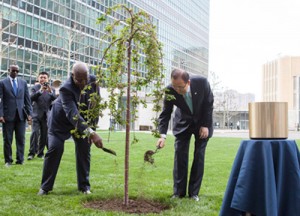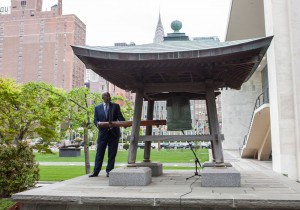New York, 6 May 2015
Statement Attributable to the Spokesperson for the President of the General Assembly
The High-Level Thematic Debate on Strengthening Cooperation between the United Nations and Regional and Sub-regional Organizations, held on 4 May 2015 at the General Assembly, underscored the need to strengthen cooperation between the United Nations and regional and sub-regional organizations in the areas of peace and security, human rights and development to effectively address the numerous challenges facing the international community. Convened by the President of the General Assembly (PGA), H.E. Mr. Sam Kahamba Kutesa, and attended by the the President of the Republic of Uganda, H.E. Mr. Yoweri Kaguta Museveni, the United Nations Secretary-General, H.E. Mr. Ban Ki-moon, several Ministers and high-level representatives, the high-level thematic debate consisted of an opening plenary, and two interactive discussions.
Opening Segment
Recalling, in his opening statement, that over 25 regional and sub-regional organizations established formal cooperative relationships with the United Nations, President Kutesa stressed that, as the formulation of a universal, transformative post-2015 development agenda is underway, “ultimately, the implementation of the new agenda will be done on the ground – in our regions, countries and communities.” He further stated that “the distinctive role regional and sub-regional organizations can play in addressing some of the world’s most persistent challenges is as important as ever.” The PGA noted that these organizations are already addressing many challenges of sustainable development, and merging threats to international peace and security, and stressed that “much more remains to be done to further strengthen cooperation between the UN and regional and sub-regional organizations.” The President of the General Assembly urged Member States and stakeholders of the international community to “build on the lessons of our past and current experiences to create ever more innovative and flexible partnership arrangements that draw on respective strengths, while encouraging expanded cooperation and dialogue. “
Speaking after the PGA, the United Nations Secretary-General stated that “Conflict, poverty, violence, exclusion and disasters are grave and growing problems,” and that “no country was immune from global threats, and no one country — however powerful — could respond alone to such problems.” He singled out the Ebola crisis, the tragedy of migrants in the Mediterranean and the rise of extremism, as examples that should drive the international community to develop, agree on, and implement a collective response to global crises.
Keynote Address
The President of the Republic of Uganda, H.E. Mr. Yoweri Kaguta Museveni, delivered the high-level event’s Keynote address. He recalled that Chapter VIII of the Charter of the United Nations provides for cooperation between the United Nations and Regional Organizations, and stressed the need to ensure that the views of regional and sub-regional organizations and actors on crucial decisions on international peace and security are taken into account , instead of being influenced “mostly by the veto-wielding members” of the Security Council. President Museveni, noted that “this is a big mistake and has already caused a lot of harm to Africa, like in the case of Libya where Africa’s opinion was ignored hence, the present massive human hemorrhage in that area.” The President of Uganda believed that “if the Security Council members that took military action in Libya had listened to the voice of Africa, the present chaos in Libya, Nigeria, Mali, the people who are dying in the Mediterranean Sea from the African shores trying to get to Europe, could have been avoided.” He added that “in fact, Gaddafi’s Libya used to employ many workers from Africa.”
The Keynote Speaker suggested that “the United Nations should, therefore, respect processes that are undertaken by the regional organizations especially in areas of conflict resolution.”
He urged that “the UN should not just blindly pursue the option of placing sanctions on individuals or referring them to the International Criminal Court without holding consultations with the regions affected as this often undermines the very process of resolving the conflict in question”, underlining that “where the UN has worked in consonance with regional or sub-regional organizations, there have been tangible positive results as is the case in Somalia and Burundi.”
President Yoweri Museveni said that his country Uganda and the African continent have been advocating for “African solutions for African problems,” for a long time. Stressing that where the UN has worked together with regional and sub-regional organizations tangible and positive results have been attained, he stated that “in the long run, we shall need partnerships with the international community, including the UN, to develop our own capacities. To demonstrate our resolve to address these challenges, Uganda strongly supports the African Union’s commitment to increase the proportion of the cost of AU peace operations covered by its Member States.”
The President of Uganda concluded that strengthening cooperation between the UN and Regional and Sub-regional Organizations, will indeed greatly benefit the implementation of post-2015 development agenda.
Other Statements, Interactive Panel Discussions, Closing Segment and Adoption of the Political Declaration
Following the keynote address, several government ministers from Angola, Bahamas, Gabon, Sweden, Romania and Uganda as well as heads and representatives of regional, sub-regional organizations and UN Economic Commissions participated including the African Union, Caribbean Community, European Union, Organization of American States, Organization of Islamic Cooperation, Arab League, Organization for Security and Cooperation in Europe, Intergovernmental Authority on Development, Economic Commission for Africa, Economic Commission for Latin America and the Caribbean, among others. The interactive panel discussions, moderated by the Under-Secretary-General for Political Affairs, Mr. Jeffrey Feltman and the President of the Centre for International Relations and Development, Mr. Vuk Jeremic, also President of the 67th Session of the General Assembly, discussed a wide array of important issues, such as emerging threats, challenges pertaining to sustainable development, climate change as a defining challenge of our time, women’s empowerment, freedom and human rights, inter-regional partnerships, international crime and trafficking, the economic and environment challenges of countries in special situations, and the need for more systematic reporting and better mobilization of resources for the successful implementation of mandates and global strategies.
At the conclusion of the high-level thematic debate, President Kutesa thanked the panelists and participants for their valuable contributions. The President of the General Assembly noted that many speakers stressed that the interconnectivity of our modern-day world implies that no single country can respond to regional or global challenges alone. He also noted that “Regional and Sub-regional organizations will have an important role to play in the implementation of the post-2015 development agenda, as well as addressing climate change.”
A Political Declaration on Strengthening Cooperation between the United Nations and Regional and Sub-regional Organizations was adopted on 5 May 2015, as the outcome of the event. President Kutesa said that the adoption of the Political Declaration “is an important step in advancing and strengthening strategic partnerships between the UN and regional and sub-regional organizations.” The PGA hailed “the unanimous support for this Declaration on an issue that is one of the key priorities of this session of the General Assembly”.
Commemorations Marking the End of the World War II
On 5 May, President Kutesa, Secretary-General Ban Ki-moon, and Ms. Penny Abeywardena, Commissioner of the City of New York, Mayor’s Office for International Affairs, commemorated the ending of the Second World War with a tree planting at the United Nations Headquarters. The PGA recalled that “The end of the War is inextricably linked to the creation of the UN, which was founded, in part, to prevent such catastrophes from ever happening again”.
The ceremony was followed by the Special Solemn Meeting of the General Assembly in Commemoration of All Victims of the Second World War. On that occasion, President Kutesa reminded the audience that, as the world celebrates the 70th anniversary of the end of the Second World War and of the creation of the United Nations, “the war not only shaped the Organization’s mission, but its lessons continue to guide our work around the world”.
Peace Bell Ceremony at United Nations Japanese Gardens
On 6 May, President Sam Kutesa, Secretary-General Ban Ki-moon, and other dignitaries, joined a ceremony marking the return of the Peace Bell to the UN Headquarters Japanese Gardens. The PGA recalled that since being donated by the Government of Japan in 1954, “this bell has served as a symbol of peace and goodwill on the grounds of the United Nations. It is both unique and emblematic, having been cast using coins collected by the United Nations Association of Japan from children of all existing UN Member States in 1952”.
Courtesy Calls

President Kutesa and Mr. Brian Bowler, new Permanent Representative of Malawi to the UN in New York. Photo/Martin Dixon
Following the ceremony, President Kutesa had a courtesy call from H. E. Mr. Brian Bowler, the new Permanent Representative of Malawi to the United Nations in New York.

President Kutesa with Mr. Ruiyun Wang, Chief Strategic Officer for Synertone Communication Corporation who was accompanied by Mr. Liangbin Xia, Secretary General of the STEM Education Foundation and Ms. Sheri Yan, CEO of Global Sustainability Foundation (GSF). Photo/Martin Dixon
The PGA also met with Mr. Ruiyun Wang, the Chief Strategic Officer for Synertone Communication Corporation who was accompanied by Mr. Liangbin Xia, Secretary General of the STEM Education Foundation and Ms. Sheri Yan, CEO of Global Sustainability Foundation (GSF). President Kutesa commended the Group for their remarkable support to education. The PGA discussed with Dr. Wang the Group’s satellite operations and potential in the design, research and development, production and related specialized technologies designed to provide greater access to and impetus for educational projects.
Photos: https://www.dropbox.com/sh/v91hmb8st8npfti/AAAL1j-vH3Oz1ujVMCQQM98ga?dl=0 (Credit: Photo/Martin Dixon)



